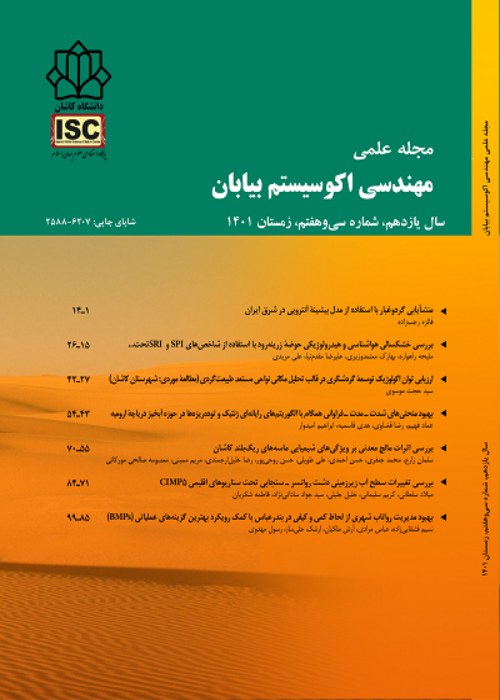Investigating the Effect of Palm Tree's Waste Biochar on Concentration of Elements, Sodium Adsorption Ratio (SAR), and Some Saline Soil's Physical Properties
Salinity is an important environmental stressor that affects plant growth. In saline soils, plants are subjected to some toxic ions and water shortages. Crop residues are considered major organic agricultural wastes that can be useful for the soil and the plants. Organic matter has positive effects on the soil's physical and chemical properties. Converting agricultural wastes to Biochar is an appropriate way to achieve a valuable amendment. Biochar is a carbon-rich decomposition-resistant product obtained by heating biomass in an oxygen-free chamber, being used for carbon sequestration by applying large amounts of carbon.Moreover, as a highly stable residue in the soil, it has been proven to store atmospheric carbon for hundreds to millions of years. According to different studies' findings, the application of Biochar can increase the soil's water-holding capacity, microbial activity, and nutrient availability. However, its effect on soil properties depends on its source and the extent of its application. As the dependency of Biochar's effects on saline soils' properties in such soils has been under-researched, this study attempted to investigate the effect of palm-tree residues' Biochar on the physical and chemical properties of saline soils.
the required Biochar was prepared from palm trees' residues at 500°C under limited oxygen conditions. This experiment was conducted in a completely randomized design with three replications. Biochar was mixed at 0, 0.5, 1, 1.5, and 2% rates with saline soils and incubated with humidity at field capacity for 90 days. Then, the samples were air-dried, and some physicochemical characteristics of the soil were determined. Moreover, the comparison of the means was performed using Duncan's test at a confidence level of 95%.
The results showed that applying the Biochar obtained from palm trees to the soil significantly increased the soil's chemical properties such as electrical conductivity (EC), organic carbon, calcium, magnesium, sodium, and potassium while decreased the sodium adsorption ratio (SAR), and the sodium/potassium ratio. Moreover, while adding Biochar to the soil increased the porosity by 10% and reduced the bulk density by 4%, treatments did not significantly affect pH, available phosphorus, field capacity, and the soil's particle density. Furthermore, adding 2%, Biochar increased calcium concentration in soil by 2.08 times compared to that of the control treatment. It was also found that the changes in the soil's magnesium calcium were similar and that using more Biochar increased magnesium concentration by 2.88 times compared to what was observed in the control treatment (more than the control treatment). Therefore, the study's findings indicated that the available potassium concentration in soil increased significantly following the application of different biochar levels. It was also found that compared to the control treatment, the amount of potassium increased about 12.33 and 18.79 times, respectively, with an increase of bio-dates in 1.5 and 2% treatments. Moreover, the highest increase in sodium was related to applying a 2% biochar date, which was 49.35% more than that of the control treatment. Finally, using 2% biochar reduced the sodium adsorption ratio by 7.6%.
This study showed that palm trees' Biochar improved some saline soil parameters such as SAR, organic matter, and nutrients. Increased EC is due to increased sodium as a destructive factor and other cations such as calcium, magnesium, and potassium as helpful plant nutrients. On the other hand, the sodium to potassium ratio was decreased. Moreover, it was suggested that the potassium was increased more than sodium, and that was why the index was improved. According to the study's findings, Biochar increased porosity due to its high specific surface area.Moreover, using 2% biochar treatment increased the saline soil's organic carbon by approximately three times. Due to the Biochar's low specific gravity, it can be expected that the soil's density is decreased by applying Biochar in soil. However, the increase in Biochar did not significantly affect the soil's particle density, which is probably due to the low weight of biochar particles versus the high weight of the soil's minerals and the amount of Biochar applied. It seems that applying Biochar as an amendment can improve the saline soil's properties and that the size of biochar particles may have different effects on changing the soil's properties, which can be investigated in future researches.
- حق عضویت دریافتی صرف حمایت از نشریات عضو و نگهداری، تکمیل و توسعه مگیران میشود.
- پرداخت حق اشتراک و دانلود مقالات اجازه بازنشر آن در سایر رسانههای چاپی و دیجیتال را به کاربر نمیدهد.




